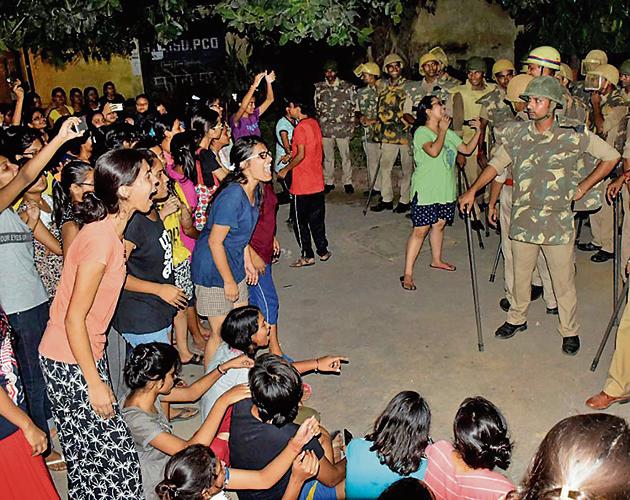BHU unrest is a result of systemic flaws and misogynistic regulations
Students protests at BHU came in the backdrop of increasing incidents of sexual harassment at the campus, failure of the administration to deal with them and absence of any grievance redress mechanism
In the early 1970s, the departments of music and medicine at Banaras Hindu University (BHU) had a slugfest over a piece of land around one kilometre west from one of the university’s entrance gates known as Lanka Gate. At the behest of the then students’ union, the land was converted into a ground called Madhuban in which various departments would display their products -- such as the installation of a nude woman put up by the Arts faculty. Madhuban also became a spot where couples would routinely hang out. The park had no gates and no timings.

Today, Madhuban closes at 6pm. And the art installation is often found covered with a piece of cloth.
“This is how regressive BHU has become in the last three decades,” said Chanchal, who was the president of the university student union at that time. “Students at BHU are conscious adults who can vote and are intelligent enough to choose a government. They need not be told who to meet and at what time,” he added.
Violent protests broke out at BHU last week after a female student’s complaint of sexual harassment and the protest that followed was deal with by a police lathi charge.
After the crackdown by the police and the announcement of early vacations, students are unsure if the protest will revive once the campus reopens. “All of us were really happy to see that finally, we could register our protest. But then came the festive season. It has made things little uncertain,” said Shreya Pant, a postgraduate student at BHU. “Also, the girls who have returned home will be under tremendous pressure from their parents who will counsel them to stay away from protests.”
What direction does the protest take also depends on the fate of BHU vice chancellor Girish Chandra Tripathi. “We foresee that he will be asked to leave before his term ends in December,” said Anisha Ghosh, a postgraduate student.
No advertisement for a new VC has been issued resulting in speculation that Tripathi will get an extension. “No chance. Not after this episode (lathicharge on students),” said Ghosh’s classmate Mansi Garg. “We will be mighty surprised if he gets an extension,” said Akanksha Sharma, who been studying at BHU for eight years.
However, things are not going to remain same on campus. “What the protest has achieved is that girls will continue to be vocal in the months to come and such matters will not be scuttled. A beginning has been made,” said Sharma.
Considering the bizarre rules in the campus, increasing incidents of harassment and an inept administration to deal with it, most of the BHU students HT spoke to, said that the last week’s unrest was bound to happen. In October 2016, HT reported how sexist rules are stifling life for girls in the BHU campus. “Our friends in other campuses laugh at us when we share the bizarre rules here with them,” said Pooja Shrivastava, a research student.
Sonal Chandel, who is studying medicine at BHU said, “It (the protest) was the result of pent-up anger. It began with the complaint by one girl and gradually hundreds of students joined her. It became intense because the majority of the girls could relate with the survivor. They got a platform.”
Dr Vishwanath Pandey, former PRO of the university said, “Hooliganism has increased in the last two-three years. Anyone denying this will be lying.”
There is palpable anger on the way the VC handled the protest. “Even as the scale of the protest kept increasing, the VC opted for interactions with media channels instead of addressing students. This shows the huge communication gap between students and the administration,” said Chandel.
Scratching the surface, one finds that many of the current issues plaguing BHU are because of systemic flaws. For example, the university has an executive council, the members of which are nominated by the president of India, and have no accountability. In other words, the top administrative body is ad-hocish.
Also, this council has no say in the selection of the VC. “There is choked democracy in BHU. The VC is at the helm of affairs and decides everything on the basis of his formed opinion,” said Dr Pandey.





